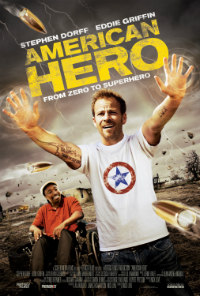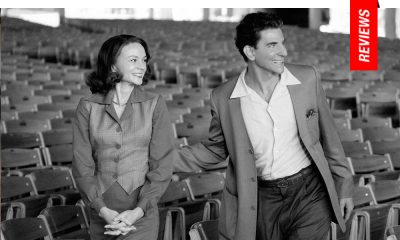Reviews
American Hero | Review
Street Wise Hercules: Love’s Homespun Superhero Film Too Conventional for Kicks
 No one can deny the super hero is now an immovable staple of Hollywood tent pole filmmaking, having overrun the mainstream market in every conceivable fashion via standalone films, hybrid mash-ups and valiant ensembles. Imperceptibly, these narratives have also infiltrated smaller budgeted endeavors and even independent American cinema, albeit to less substantial effect. British director Nick Love (The Sweeney, 2012), known for a growing filmography built on the type of crime tinged action films once proliferated by Guy Ritchie, makes a curious move overseas with the New Orleans set American Hero, a narrative more interesting than its generic title otherwise suggests. The exploits of a working class man wrapped up in his own downward spiral despite having unexplainable yet extraordinary super powers will have audiences nitpicking its derivative components despite its quality production values and an otherwise persuasive performance from Stephen Dorff.
No one can deny the super hero is now an immovable staple of Hollywood tent pole filmmaking, having overrun the mainstream market in every conceivable fashion via standalone films, hybrid mash-ups and valiant ensembles. Imperceptibly, these narratives have also infiltrated smaller budgeted endeavors and even independent American cinema, albeit to less substantial effect. British director Nick Love (The Sweeney, 2012), known for a growing filmography built on the type of crime tinged action films once proliferated by Guy Ritchie, makes a curious move overseas with the New Orleans set American Hero, a narrative more interesting than its generic title otherwise suggests. The exploits of a working class man wrapped up in his own downward spiral despite having unexplainable yet extraordinary super powers will have audiences nitpicking its derivative components despite its quality production values and an otherwise persuasive performance from Stephen Dorff.
Melvin (Dorff) has telekinetic super powers, but instead of using his gifts for good he’d much rather continue to party recklessly, womanizing his way through post-Katrina New Orleans in an alcohol induced haze. But he’s due for a rude awakening when ex-wife Doreen (Keena Ferguson) wins custody of their son Rex (Jonathan Billions) and Melvin is no longer allowed contact. After a life-threatening incident, Melvin decides to get sober and rid his neighborhood of riff-raff, something his best bud Lucille (Eddie Griffin), a wheelchair bound Iraq vet, has always supported despite his enabling presence as a fellow irresponsible adult.
The drug addled, broken down super hero is a trope audiences associate with Peter Berg’s maudlin 2008 film Hancock, while self-willed wannabes have been popular protagonists from all economic backgrounds with everyone from Bruce Wayne’s Batman to the blue collar street heroes fighting crime in the Kick-Ass films, James Gunn’s enjoyable Super (2010), or the inventive pharmaceutical angle used in Special (2006), starring Michael Rapaport. The visual gimmick of Love’s American Hero most resembles Josh Trank’s surprise hit Chronicle (2012) in that a shaky, hand-held camera anchors the film as a faux-documentary p.o.v. However, it’s nearly always a glaring distraction, causing a constant disconnect from characters we should have spent more time with to appreciate the dramatic tones Love tries to enhance for its truncated finale. It’s not clearly defined why or how a documentary crew is following Melvin around, with characters sometimes speaking directly into the camera, while other moments have chosen to be enhanced by non-diegetic music.
The post-Katrina defined specifics lend a particular subtext to the material, but Love doesn’t seem to focus on the potential commentary dealing with the American concept of heroism in areas so desperately in need of it. Likewise, the racial disparities wrapped up in these motifs are also provocative aspects, but Love provides commentary via superficial comedy, with characters referring to Dorff and Love as Black Man and Robin. In essence, Love seems only to be confirming the prized perspective of the white savior, granted all the benefits his crippled sidekick, a racial other, doesn’t have access to. Love’s screenplay also squanders characterization, trapping Melvin in a banal emotional conflict with his ex-wife who has usurped custody over their son (again, the mixed race motif lends itself to interesting to interpretations with a child who has potentially inherited ‘superpowers’ from his white father).
Beyond its confusing visual parameters, some clever editing and impressive special effects assist in making American Hero look better than it might sound. As Melvin’s wisecracking sidekick Lucille, Eddie Griffin provides most of the laughs and even a bit of emotional integrity as the other half of the narrative’s most definable relationship. Stephen Dorff gives a committed, engaging performance and his Melvin is one of many examples in his filmography of the actor’s scruffy, perpetually stylized bed-headed anti-heroes. Had Love taken the time to completely define the universe of Melvin and Lucille and taken advantage of his scenario’s daring possibilities, maybe American Hero wouldn’t feel like the generic label of an expensive brand we’ve been choking on for years.
★★½/☆☆☆☆☆



































